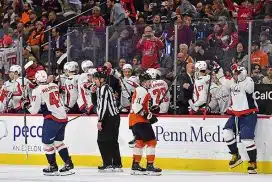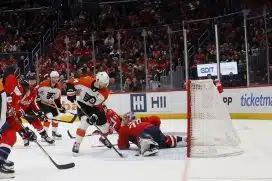By Kevin Durso, Sports Talk Philly editor
Before the Flyers sat of the cusp of reaching the Stanley Cup Final for the second time in four years, they had to get into the conference final. They faced long odds to do so.
You see, in the 2000 Eastern Conference semi-finals against Pittsburgh, the Flyers fell into a hole and were one mistake away from facing the near-impossible 3-0 deficit. An unlikely hero emerged and gave the Flyers some life.
When the Flyers evened the series up in an all-time classic game, all momentum had shifted for good. The Flyers rolled back at home and finished off the series in six games.
Here is a closer look at the next series in our Series in Review sequence, a look at the 2000 Eastern Conference semi-finals between the Flyers and Penguins.
Game 1: Penguins 2, Flyers 0
Despite dominating this game in shots, 28-14, the Flyers could simply not solve Ron Tugnutt. The Pittsburgh netminder was up to the task on everything that night and two of the Penguins top scorers took care of everything.
Jaromir Jagr got the Penguins on the board in the first period at 13:33. The Flyers had two power plays late in the first and midway through the second, but couldn’t take advantage.
In the third, Martin Straka scored at 4:46 to make it 2-0 and the Flyers took two penalties in short order after the goal, cutting into their time to make a comeback. Tugnutt finished off the shutout and the Penguins grabbed the lead in the series in Philadelphia.
Game 2: Penguins 4, Flyers 1
Game 1 featured just two goals and neither power play was able to cash in. Pittsburgh took full advantage of their chances early.
At 16:57 of the first period, Robert Lang scored on the power play. With 5:15 left in the second, Jagr added a power-play goal as well. With 3:30 to go, Lang got on the board again and the rout was on at 3-0.
The Flyers got on the board for the first time in the series at 4:34 of the third with Simon Gagne scoring, but Jagr’s second of the game at 10:59 capped the scoring. With the game put away late in the third, a line brawl broke out with 5:09 remaining. Though the Flyers had again dominated in shots, with Tugnutt stopping 44 of 45 shots in the game to 25 shots for the Penguins, they trailed in the series, 2-0, and headed to Pittsburgh.
Game 3: Flyers 4, Penguins 3 (F/OT)
For the Flyers to get back into the series, they needed a win in Game 3 and they finally got off to the start they were looking for. Andy Delmore opened the scoring at 14:11 of the first and Keith Jones added a second goal at 16:27 to give the Flyers a 2-0 lead.
Just 40 seconds into the second, Jagr scored to cut the lead to one and Straka tied it up at 10:23. Just like that, the Flyers were back in a battle.
In the third, John LeClair scored at 7:27 to give the Flyers the lead again, but Jagr struck again for his second of the game and fifth in the series with 5:32 remaining to even things up at three.
That would force overtime and the Flyers were one mishap away from facing a 3-0 deficit. Instead, they got the break they needed when Jones was able to feed Delmore cutting in and he fired high over Tugnutt to give the Flyers the win in overtime at 11:01, putting them back in the series down 2-1.
Game 4: Flyers 2, Penguins 1 (F/5OT)
Winning Game 3 made it a series again, but a loss in Game 4 would have put the Flyers on the brink as well with not a lot of hope for rebound. As the game unfolded, the pressure and momentum of the series just continued to increase.
It took the Penguins just 2:22 to get on the board with Alex Kovalev getting his first goal of the series. And for over two periods, that was the only scoring to speak of.
Finally, at 4:47 of the third period, the Flyers were on the power play and got a deflection from LeClair off an Eric Desjardins shot to tie the game at one. The goal went through a lengthy review process for a high stick, but was ruled a good goal and the tie remained.
That started a marathon of a night. The game went to overtime and through the first 20 minutes, there was no scoring and just two concurrent penalties issued. The second overtime came and went as well. In the third overtime, the Flyers were penalized twice, first with Daymond Langkow taking a high-sticking penalty just 25 seconds into the period and then Rick Tocchet serving a bench minor penalty. The Penguins also took a penalty in the third overtime, as Darius Kasparaitis went to the box for holding with 6:39 to play. Still, there was no scoring as an entire second hockey game had played out without the game being decided.
The fourth overtime also came and went and the game dragged on into the fifth overtime. By this point, players were scrounging around for anything they could get their hands on to refuel. They had eaten everything that was readied for the post-game meal and there were pizzas delivered mid-game to try to help the players get up the energy to continue.
Finally, at 12:01 of the fifth overtime at 2:35 a.m., Keith Primeau put an end to the marathon, cutting back toward the slot around Kasparaitis and beating Tugnutt over the shoulder with a rising shot to give the Flyers the 2-1 lead and even the series at two games apiece. It was the 72nd shot of the game for the Flyers. For the fourth straight game, the Flyers heavily outshot the Penguins, as Brian Boucher admirably made 57 saves and did not allow a goal for the final 149:26 of the game.
Game 5: Flyers 6, Penguins 3
With the series shifting back to Philadelphia with momentum clearly on the Flyers side, they wasted little time showing that the series was firmly in their grasp. Just 23 seconds into the game, Langkow scored and just over three minutes later, Delmore fired one home from the point to make it 2-0 on the power play.
Just 16 seconds into the second period, Dan McGillis scored and Mark Recchi added another power-play goal at 3:47 to open up a 4-0 lead. Pittsburgh got on the board at 15:06 with Tyler Wright scoring, but Delmore’s second of the game off an odd-man rush with 2:10 remaining in the period made it 5-1.
Kasparaitis scored just 40 seconds into the third to make it 5-2, but Delmore capped off his hat trick with a one-timer from the slot off a set-up from Game 4 hero Primeau to make it 6-2. Rob Brown added a goal at 8:42 to cap the scoring and cut the lead back to three, but by that point, the celebration was on in Philly and the Flyers were now one game from advancing.
Game 6: Flyers 2, Penguins 1
By this point, the Flyers had the Penguins on the run and in Game 6, they hit the road looking to put an end to the series and not allow momentum to shift. Recchi struck for the game’s first goal at 11:04 on the power play to give the Flyers the lead.
Just 44 seconds into the second, LeClair scored to make it 2-0. Boucher continued his solid run in the playoffs from there. He was nearly perfect, allowing just one third-period goal to Rene Corbet with 9:14 remaining. Boucher finished with 27 saves as the Flyers locked down the game and the series, outshooting the Penguins for the sixth time in the series.
When people look back on great Flyers playoff moments, they often think of this series. Obviously, Game 4 stands out. The marathon victory in Pittsburgh with Primeau’s game-winner in the fifth overtime is a moment that will live forever in hockey history. That game remains the third-longest in NHL history and the longest in the Expansion Era. But think about the impact of Delmore’s OT winner in Game 3 when the Flyers could have easily had their backs against the wall with a loss? Think about Delmore’s impact on Game 5 and his hat trick? Think about the wild balance of scoring in the series. The Flyers had 15 total goals in the series, five of them from Delmore, three from LeClair, two from Recchi, and one from five other players. The Penguins had 14 goals in the series and five were by Jagr. Their final four goals of the series were all from players who did not have a goal prior in the series and came while the team was trailing.
For so much of the final four games, the Flyers were in control, especially after the five-overtime victory. Much like the Flyers comeback in Boston in 2010, there was momentum moving forward in the playoff run, and the Flyers used it to get a 3-1 advantage in the conference final against New Jersey. Unfortunately, that’s where everything changed and the Flyers season and Stanley Cup hopes fell apart after that.
Tomorrow, we will continue our Series in Review with a look at the 1997 Eastern Conference Final between the Flyers and Rangers.







